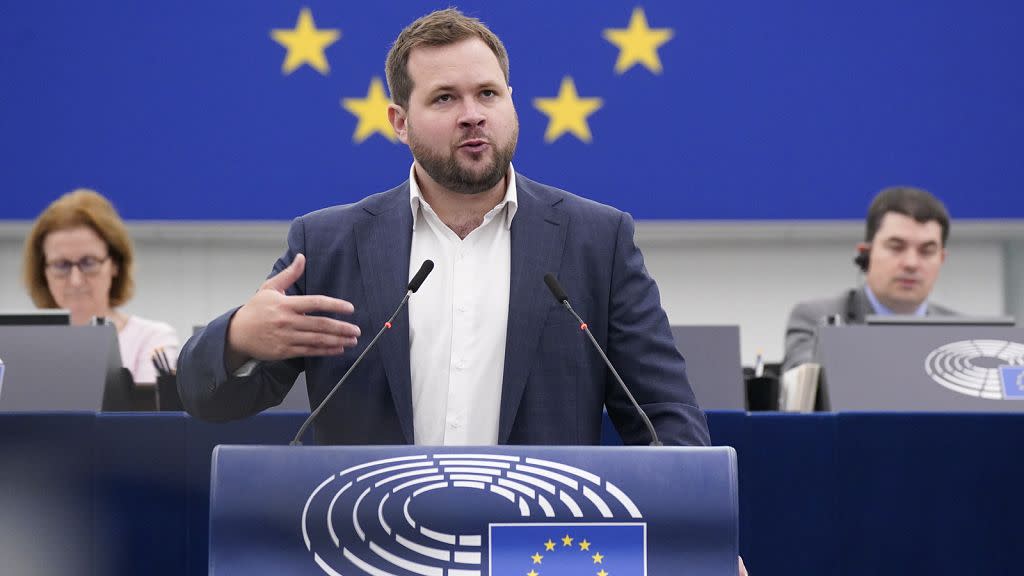EBU woes deepen as two political parties slam exclusion from election debate

The European Broadcasting Union (EBU) is under further scrutiny after it was accused by two political parties of excluding them from its Eurovision election debate.
The far-right Identity and Democracy (ID) party and the regionalist, separatist European Free Alliance (EFA) both say they have been intentionally shunned by the organisers of the debate, set to take place at the European Parliament in Brussels on May 23 ahead of June's European elections.
In correspondence seen by Euronews, the ID Party - which harbours the likes of France's Rassemblement National, Italy's Lega and Germany's Alternative für Deutschland and which forms its own group in the European Parliament - was told by the EBU that it could not be represented at the debate because it had not fielded an official lead candidate, known as Spitzenkandidat, for the ballot.
The Spitzenkandidat process requires all major European parties to select a lead candidate to bid for the role of president of the European Commission, the bloc's powerful executive arm. But the process has been notoriously spurned in the past, with current president Ursula von der Leyen parachuted to the role in 2019 despite not officially running.
In a letter addressed to European Parliament President Roberta Metsola, also seen by Euronews, the ID group’s co-chairs claim the EBU’s rules are inconsistent. Other parties fielding more than one lead candidate, which ID says also “goes against” the principle of the Spitzenkandidat, have been invited to the debate.
Renew Europe, which is fielding three lead candidates, will be represented by Sandro Gozi, while the Greens, who have two lead candidates, will send Terry Reintke to the televised stand-off.
The EBU says that it sent invitations to parties from the seven political groups in the European Parliament and made clear that the Eurovision debate was a “forum for lead candidates for the position of European Commission President” under the Spitzenkandidat system.
"Two parties, the ECR and ID, declined to nominate a lead candidate and have therefore made themselves ineligible for this particular debate," the Geneva-based broadcasting union said in a statement shared with Euronews.
ID has urged President Metsola to weigh in and urge the EBU to retract the decision and allow MEP Anders Vistisen of the far-right populist Danish People's Party to participate on behalf of the group.
The EBU debate is one of three electoral debates taking place ahead of June's vote. Vistisen represented the ID group in the Maastricht debate held in April while Maylis Roßberg took part on behalf of the EFA.
EFA also criticises its exclusion
The European Free Alliance (EFA), home to Europe's regionalist and separatist parties, also published a statement on Tuesday alleging it had been deliberately excluded from the debate.
The party sits along with the Greens as part of the Greens/EFA group in the European Parliament. According to the EBU, its rules mean only one candidate from each of the parliament's seven political groups can take place in the debate, in this case the Greens' Terry Reintke.
"In coordination with the European Parliament, the EBU invited political parties in the European Parliament to nominate one Lead Candidate from each of the 7 official political groups represented," the EBU told Euronews in a statement.
"The parties within those groups made the selection of the lead candidate. For the Group of the Greens/European Free Alliance, the lead candidate put forward was Terry Reintke, from the party of European Greens," it adds.
EFA has nominated two lead candidates for June's election, 23-year-old Roßberg from the Danish-German border region and Catalan independentist Raül Romeva, a former MEP sentenced to a 12-year prison term in 2019 on charges of sedition, but pardoned by Spanish prime minister Pedro Sánchez in 2021.
In its statement, EFA claims that the parliament's spokesperson Jaume Duch had asked the party to nominate a responsible contact person for discussions with the EBU in January and that a kick-off meeting was held, but that no communication was then received.
It says that the rules limiting speakers to one lead candidate per political group were communicated to them on 30 April 2024, and denounces the EBU for its "lack of communication and transparency."
"We want to express our deepest disappointment and unconformity with this decision. European democracy deserves more. By shutting the door on our participation, the EBU is not only silencing the voices of smaller parties but also undermining the principles of democracy and inclusivity," the party said.
The EBU maintains that its rules were made clear to all parties, and that it looks forward to a "successful and meaningful political debate at a crucial time for European politics."
Both the ID group and the EFA are calling on the EBU to rectify its decision.
Adding fuel to fire
The allegations come just a day after the European Commission censured the EBU's decision to ban EU flags at the Eurovision Song Contest in Malmö, Sweden over the weekend.
Commission Vice-President Margaritis Schinas sent a letter to the broadcaster on Monday asking for the "rationale" behind the ban and for it to attribute "responsibility where it is due".
The EBU said its decision was linked to "heightened geopolitical tensions" around the song contest, during which pro-Palestinian protesters marched against the participation of Israel due to its ongoing offensive in the Gaza Strip.

